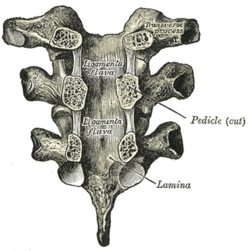|
Intertransverse ligament
The intertransverse ligaments are weak, sheet-like[1] ligaments interconnecting adjacent transverse processes in the thoracic spine, and adjacent accessory processes in the lumbar spine. They act to limit lateral flexion and rotation of the spine.[2] StructureIn the cervical region, they consist of a few irregular fibers that are largely replaced by the intertransversarii.[3] In the thoracic region, they are rounded cords intimately connected with the deep muscles of the back.[4] In the lumbar, region they are thin and membranous.[3] The intertransverse ligaments often blend with the intertransverse muscles.[5][citation needed] References
External links
|
||||||||||||||||||||||||

